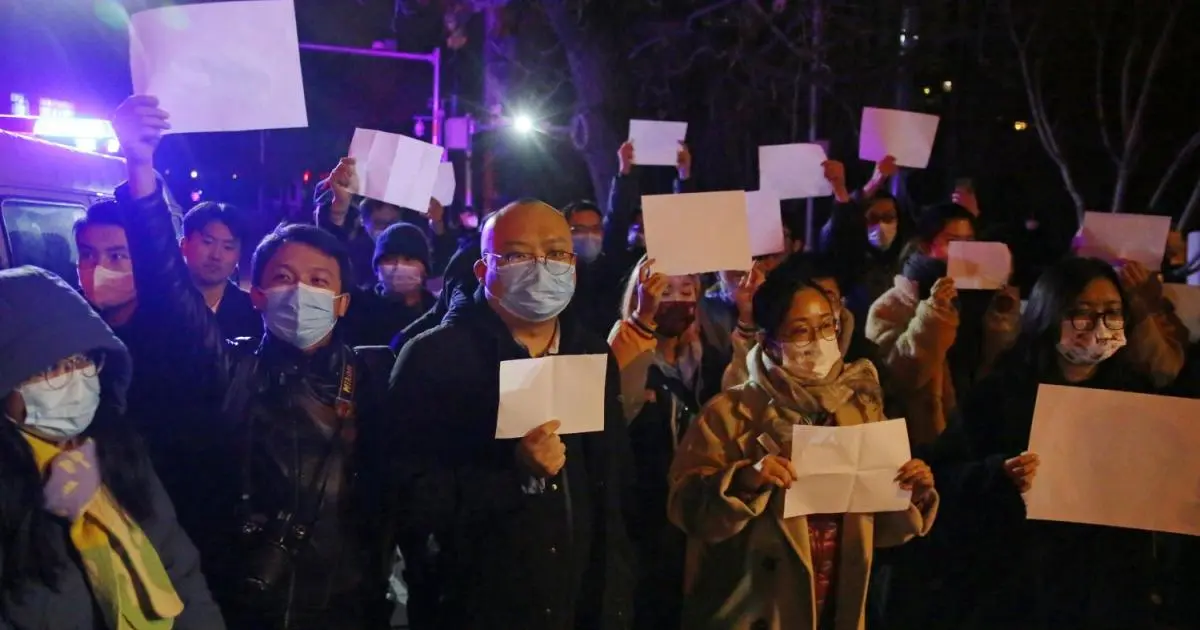In 2023,China faired badly, say leading Rights Bodies
China’s overall performance in 2023 was far behind expectations. China’s 2023 GDP showed patchy economic recovery. The government’s repression and social controls intensified. People in China started questioning the leadership of President Xi Jinping.
According to China Beige Book International’s latest survey, th recovery from COVID — disappointing as it was — is over.
China’s economy grew 5.2% in 2023, slightly more than the official target, but the recovery was far shakier than many analysts and investors expected, with a deepening property crisis, mounting deflationary risks and tepid demand casting a pall over the outlook for this year.
Expectations that the world’s second-largest economy would stage a strong post-COVID bounce quickly fizzled as the year progressed, with weak consumer and business confidence, mounting local government debts and slowing global growth sharply weighing on jobs, activity and investment, the survey reported.
China’s performance on human rights was far below the expectations. According to Human Rights Watch world report, 2024, the Chinese government’s repression and social controls have intensified in 2023, over a decade into President Xi Jinping’s rule. More people in China begin to publicly question the country’s direction under Xi’s leadership, at great personal risk.
The 2024 World Report by Human Rights Watch highlighted an escalation in the Chinese government’s repression and social controls, marking over a decade of President Xi Jinping’s rule. Despite this, there seems to be a subtle shift in the government’s aggressive stance towards Western nations as it endeavors to attract foreign investment amidst a slowing economy. However, this apparent change in rhetoric doesn’t diminish the growing public apprehension within China about the trajectory under Xi’s leadership, a sentiment expressed at considerable personal risk.
Maya Wang, acting China director at Human Rights Watch, emphasized the toll of President Xi’s repressive rule on China’s economy and society. The government’s failure to address human rights abuses seriously creates uncertainty for the nation’s future, affecting various segments, from the youth to business executives.
The report outlined the Chinese government’s continued abusive policies in Xinjiang against Uyghurs and other Turkic Muslims, deemed as crimes against humanity. Notably, individuals like Rahile Dawut, an internationally renowned anthropologist, are serving lengthy prison sentences for peaceful acts. In Tibet, authorities persist in forcibly assimilating Tibetans, with extreme information controls hindering the verification of information.
The erosion of liberties and freedoms in Hong Kong was underscored, where the Chinese government has arrested individuals arbitrarily for national security offenses, targeted exiled democracy activists, and expanded its political intimidation campaign beyond China’s borders. Across China, the tightening grip on civil society is evident, impacting foreign businesses with the government’s arbitrary use of power.
The aftermath of the “Zero-Covid” policy’s end in late 2022 is marked by a lack of official investigation into the Chinese government’s handling of the outbreak. Those who reported on and sought accountability for official abuses during the lockdowns, including citizens and journalists, have faced harassment, detention, and prosecution. In late 2023, Amnesty international came out with China’s White Paper Movement: One year on, six protesters share their stories. These stories have exposed the Chinese government’s false claims that things were under control in the pandemic. For instance, at least 10 people died in an apartment fire in the city of Urumqi, northwest China on November 24, 2022. They were reportedly prevented from escaping due to strict covid-19 controls, reported the rights body in the white movement paper.
The tragedy sparked an outpouring of anger and emotion. Across China, people took to the streets in numbers not seen for decades – many holding up blank sheets of paper to symbolize systematic censorship by the Chinese government – and the ‘White Paper’ protest movement quickly spread overseas. One year on, we hear from six people whose participation in those protests – in China and abroad – was a life-affirming experience*:
According to an overseas Chinese national, Nathan,
The White Paper Movement (and the Sitong Bridge protest a month earlier) completely changed his life. “Since October 2022, my fellow activists and I have put up solidarity posters, organized rallies and candlelight vigils – I even started an independent magazine. I did many things that I never imagined”, he stated.
“As an overseas Chinese, on one side is a foreign environment that I cannot fully integrate into, and on the other side is my homeland of China where nationalism is on the rise. I feel pessimistic and depressed in the gap between the two. I feel isolated and helpless under censorship, and I have to hide myself. But social movements have allowed me and others to see each other. We are no longer “disempowered” but can become “activists” and fight for human rights and justice. This in itself has become an identity that I am proud of. It also brought me the courage and motivation to continue participating in social change, despite the fear of retribution from the authorities, Nathan stated.
In November, the nation mourned the unexpected death of former Premier Li Keqiang, with online sentiments reflecting a preference for his economically vibrant policies over Xi’s. Throughout 2023, Beijing launched global initiatives challenging existing global governance, security, and human rights norms and institutions at the United Nations and elsewhere.
Maya Wang concluded by urging foreign leaders to recognize the long-term benefits of a more transparent, accountable, and rights-respecting Chinese government. Consistently and robustly raising human rights concerns publicly is seen as a crucial first step towards fostering positive change.













